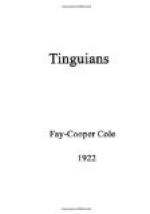In the midst of this revelry, the other medium was suddenly possessed by Kadaklan—the supreme being. The laughter and jesting ceased, and breathlessly the people listened, while the most powerful being said, “I am Kadaklan. Here in this town where I talk, you must do the things you ought to do. I hear what you say you desire, and I see what you are able to do. Something ill will befall you unless you quickly celebrate Sagobay (cf. p. 324), when there are no strangers or Christians in your town. Where is the basi which should have been in the place where I first came?” [158] Without awaiting an answer he vanished, and his wife Agemem took his place and repeated his remarks with little variation.
Sopo, a gambler, next appeared and tossed handfuls of coins into a blanket. He stated that if heads came up, the people won and would have good health, but if they lost, their lives were his. As soon as he threw, the people rushed up, and if they saw any tails they were quickly turned, and the spirit was informed that he had lost.
Kimat, lightning, came and demanded a drink, which was given. As he is usually considered as a dog, the writer inquired why he had appeared as a man, but was rewarded only by a shrug of the shoulders and the word—kadauyan ("custom").
Another spirit, Andeles, quickly replaced lightning, and with Sopo danced on the spirit raft, while the old men put dishes of water and coins inside, and fastened a small live chicken to the roof. The people then tried to induce the spirits to leave, but they refused. Suddenly they were flung aside, and two strong men seized the raft and started to run with it. Immediately the two spirits gave chase and fought viciously all who tried to get in their way, but when, finally, their opponents were joined by an old woman carrying a bundle of burning rice straw and an old man beating a drum, they gave up the chase and vanished. The party proceeded on to the Abra river, where they waded out into deep water and set the raft afloat (Plate XXVI).
That evening the guests danced da-eng, and the ceremony was over.
Throughout the three days, the mediums had been constantly drinking of basi, and while under the strain of the ceremony, they had not appeared intoxicated, but at its conclusion both were hopelessly drunk. The payment for the service was one half of the largest pig, unthreshed rice, and about two pesos in money, which was given in exchange for the beads which different spirits had demanded.
Kalangan.—In Manabo and the villages of that vicinity a period of about seven years elapses between the building of tangpap and the celebration of Kalangan, but in most of the valley towns the latter ceremony follows Pala-an after two or three years. [159] The ceremony is so similar to the Tangpap just described that only the barest outline will be given here. The chief difference in the two is the type of structure built for the spirits. Kalangan has four supporting timbers to which the flooring is lashed, and from which kingposts go to ridge poles. A bamboo frame rests on this and, in turn, supports an overhanging grass roof (Plate XXIII).




